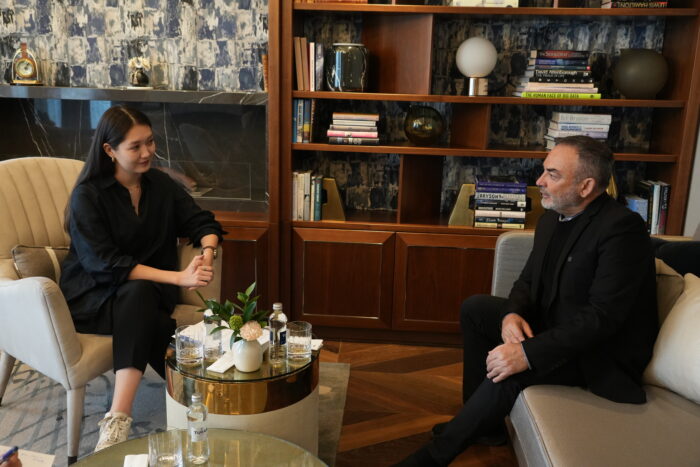ASTANA — Award-winning Spanish writer and author of numerous historical novels on the coexistence of different cultures and religions Jesús Sánchez Adalid spoke with The Astana Times about his books and Kazakhstan’s activities to promote peace, conviviality and interreligious dialogue during his recent visit to the country’s capital.

Award-winning Spanish writer and author of numerous historical novels, Jesús Sánchez Adalid. Photo credit: Antonio Amores
Sánchez Adalid holds a law degree from the University of Extremadura and a Ph.D. from the Complutense University of Madrid. Passionate about philosophy and theology, he also graduated in Canon Law from the Pontifical University of Salamanca.
The author is regarded as one of the most versatile and original writers in Spain. His novels, rigorous in facts and descriptions, delve into human relations, exploring themes of individual freedom, love, power and the search for truth.
He arrived in Kazakhstan at the invitation of the Spanish Embassy to discuss his historical novels, meet local Spaniards for his new project, and engage with the interreligious dialogue that Kazakhstan has been hosting every three years since 2003.

Interview with Jesús Sánchez Adalid. Photo credit: Antonio Amores
The Congress of World Leaders and Traditional Religions is a unique interfaith forum in Kazakhstan that has played a significant role in connecting and fostering dialogue among different cultures and civilizations.
In his revelations, Sánchez Adalid shared that he aims to raise awareness about the importance of interreligious dialogue to Spanish people, using Kazakhstan’s experience as an example.
“The genre of my work is historical novels with fictional characters set in present times. I base them on real characters and historical settings after a thorough research of certain historical events,” said Sánchez Adalid.
“For instance, I used the background of Caliph of Córdoba Al-Hakam II, who used to have the biggest library of antiquity with more than 100,000 books and who completed the royal residence Medina Azahara in 976,” he added.
In one of his best-known works, dubbed “El Mozárabe,” Sánchez Adalid takes the reader to Spain in the 10th century, rescuing the smells and aromas of the Caliphate of Córdoba and delving into the ambiance of power, prestige, and longings for peace.
“It is a story about how three religious groups coexisted in Spain. I believe it exemplifies how different cultures and religions managed to share their lives in the same place and pursued peace as a common goal,” said Sánchez Adalid.
Historically, the Caliphate of Córdoba was renowned for its intellectual and cultural achievements, greatly influenced by the coexistence of Jews, Muslims, and Christians. The caliphs established libraries, translation centers, and academies that attracted scholars from various religious backgrounds. These institutions became hubs of intellectual exchange, where scholars engaged in debates, translated ancient texts, and advanced knowledge in various fields.
According to the author, Kazakh readers can resonate with the story in his novels as both the Caliphate of Córdoba and Kazakhstan are examples of people living in peace despite cultural and religious differences as a result of tolerance set by the leaders.
“It is important to avoid fanaticism and intolerant behaviors because fanaticism only leads to war, death and destruction. Peace must be constructive,” added Sánchez Adalid.
Addressing young aspiring writers, he mentioned that literature is always inspired by real life, beauty and people.
“But the artist’s work must always have an educational basis as it is important to teach people to build peace and humanity,” said Sánchez Adalid.
He also mentioned his pleasant experience in Astana, visiting the Grand Mosque of Astana and the Astana Opera Theater.
“Both were very interesting and impressive. One for its religious significance and the other for its architectural beauty,” said Sánchez Adalid.
Throughout his career, Sánchez Adalid has collected numerous awards, including the Alfonso X el Sabio Award for Historical Novel for “Alcazaba” (2012), the Fernando Lara Novel Award for “El Alma de la Ciudad” (2007) and the Fernando Lara Novel Award for “La Mediadora” (2015).
He is an academic at the Royal Academy of Arts and Letters of Extremadura, where he also directs the library. He is also a professor of Ethics at the University of Extremadura and a Catholic priest in the parish of San José de Mérida.

